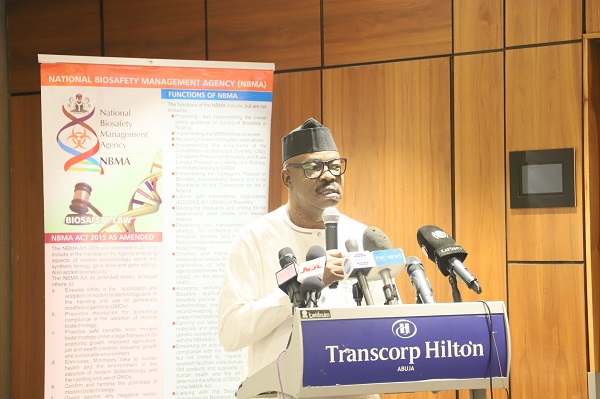
Stakeholders in the biosafety sector have convened in Abuja to firm up biorisk management of the biotechnology products to enhance safety for humans and the environment.
Speaking at the stakeholders’ workshop convened by the National Biosafety Management Agency (NBMA) in Abuja recently, the NBMA director-general, Dr. Rufus Ebegba said the meeting shows the Federal Government’s commitment to ensuring safety measures are in place while harnessing the benefits of modern biotechnology applications in the country.
“Biorisk deals with organisms that can cause harm to human health and the environment.
“These harmful organisms can [be] minimised so that they will not cause harm to human beings. Measures have been put in place to ensure that biosafety and biosecurity are ensured in Nigeria.
“We are grateful to the World Health Organisation (WHO) for the role it played in the process of developing our national biosafety process policy action plan.
“This policy came about as a result of an amendment that was effected on the national capacity management agency in 2015, which empowered the agency to put in place measures to ensure that insecurity within Nigeria’s space and issues about security is cross-sector,” he stated.
According to him, the National Biosecurity Policy approved by the Federal Executive Council (FEC) last year contained several areas which bordered on ensuring that we are protected from malicious, unintentional use of genetic, harmful biological agents.
“Nigeria as a country must be adequately prepared to protect her health environment, economy and citizens.
“The agency will only assist to strengthen those institutions and encourage them to perform maximally to ensure that we are protected from malicious use of harmful biological agents,” Ebegba explained.
Earlier, the Minister of State for Health, Hon. Joseph Ekumankama, represented by Dr. Onyinye Nwankwo, stressed that one of the aims of the gathering was to bring about better bio-risk management in implementing the National Biosecurity Policy and action plan toward achieving the objectives of the national biosecurity.
“Our next step is implementing policies aimed at institutionalising a coordinated and functional biosecurity system towards minimising the risks of biothreats to human health, biodiversity and the environment in Nigeria.
“I want to use this opportunity to encourage every stakeholder here to be part of this next phase and contribute their quarter towards achieving the objectives of the national biosecurity policy and action plan.
“The capacity-building and training of officers cannot be overemphasised in the effective management and implementation of this policy. The goals of capacity building are strengthening policy implementation of uttermost importance. It creates an avenue for the development of skills and technical know-how required to drive any process. The results and effects will be efficiency, effectiveness and sustainability.
“This will, in turn, bring about the effectiveness and comprehensive biosecurity to prevent all authorised possession loss, theft, misuse, diversion or intentional release of biological agents and toxins. This is a shared responsibility and so all hands must be on deck as we build and strengthen our capacity,” he further added.
The minister thanked the National Biosafety Management Agency (NBMA), the digital and the secure under health security partners for their collaboration in organising this very timely training on bio-risk management geared towards addressing threats in Nigeria.
He added that the health security partners have proven to be dedicated to duty carrying out their mandates in improving health security globally.
The director of the scientific programme, Health Security Partners (HSP), Dr. Prasad Kuduralli explained that his organisation is a non-profit organisation based in Washington DC.
“We are dedicated to promoting health security globally.
“We hope to bring together national and international parties to provide training, mentorship, technical assistance and grants for capacity strengthening. Our goal is to partner with people of the world. We operate in more than 30 countries,” he stated.
He added that bio-risk management at the Institution level helps in continuing assessing risk and putting into place measures of biosafety and biosecurity to ensure that the risk is minimised.

